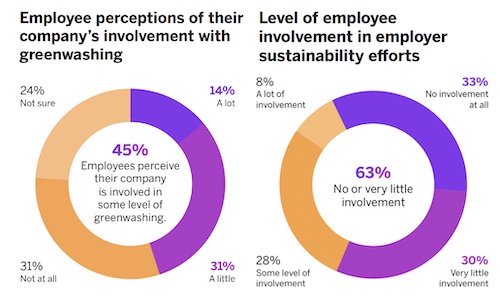 |
Employees are on board with corporate initiatives to create a more sustainable world, but companies are dropping the ball when it comes to communicating the details of their sustainability plans to the workforce, according to new research from WE Communications.
The lack of focused messaging and effective engagement on these issues is leading to a growth of “green fatigue,” in which talk about sustainability is losing much of its impact, often becoming little more than background noise.
It also is resulting in a high degree of skepticism, with almost half (45 percent) of the 2,000 employees surveyed saying that they suspect the companies they work for of indulging in “greenwashing,” or misrepresenting their sustainability efforts.
Interest in these issues remains high, with 86 percent of those surveyed saying that companies should be committed to sustainability and reducing environmental impact. However, less than four in 10 (38 percent) said that their employer has actually made sustainability commitments.
 |
One big sign of the communications gap between management and employees: Close to two-thirds (63 percent) of survey respondents say employees at their company have very little or no involvement in their employer’s sustainability efforts. Perhaps not surprisingly, that lack of employee involvement is only noted by 41 percent of executives, but it rises to 70 percent for support staff.
WE’s report outlines several internal communications strategies that companies can use to raise the engagement level of employees on these issues and increase their sense of partnership about sustainability efforts.
Number one on their list is making sustainability an integral part of the work environment through such policies as providing employees with environmentally friendly workplace tools, showing them how sustainability policies are changing their day-to-day work, sharing regular updates and offering time off to allow employees to volunteer or participate in sustainability activities.
Other potential initiatives include raising the profile of a company’s sustainability efforts with outside organizations and setting concrete deadlines for those efforts. Almost nine out of 10 respondents (88 percent) who know about their companies’ time-based sustainability initiatives say that they expect their employer to meet at least some of those commitments, and a surprising 75 percent would understand if those goals were missed.
The report also stresses giving communications about sustainability a personal touch. For example, more than half (58 percent) of senior and middle managers and support staff said an email from a company leader is one of the top three ways in which they’d like to be informted about sustainability programs and goals.
The WE survey was conducted by YouGov in February, and consisted of 150 people in C-Suite or executive management positions, 700 in upper and middle management, and 1,143 in frontline, support and junior staff.


 Consumers who once demanded convenience now require consistent, multi-channel experiences that cater to them at every point. Brands must have a clear, audience-appropriate, and channel-specific voice across all platforms.
Consumers who once demanded convenience now require consistent, multi-channel experiences that cater to them at every point. Brands must have a clear, audience-appropriate, and channel-specific voice across all platforms. Employees at U.S. companies are experiencing high levels of burnout, but managers are lagging behind when it comes to their awareness of the problem
Employees at U.S. companies are experiencing high levels of burnout, but managers are lagging behind when it comes to their awareness of the problem Brand has a powerful effect on a company’s valuation, but the level of brand understanding in the investment community leaves a lot to be desired, according to a new study from Brodeur Partners, Interbrand and NewtonX.
Brand has a powerful effect on a company’s valuation, but the level of brand understanding in the investment community leaves a lot to be desired, according to a new study from Brodeur Partners, Interbrand and NewtonX. AI may still be viewed with a wary eye by most media pros, but its use is growing, according to a new study from Muck Rack.
AI may still be viewed with a wary eye by most media pros, but its use is growing, according to a new study from Muck Rack. A new study from Walker Sands says that some marketers have been putting the cart before the horse when it comes to the relationship between marketing channels and business outcomes.
A new study from Walker Sands says that some marketers have been putting the cart before the horse when it comes to the relationship between marketing channels and business outcomes.


 Have a comment? Send it to
Have a comment? Send it to 
No comments have been submitted for this story yet.